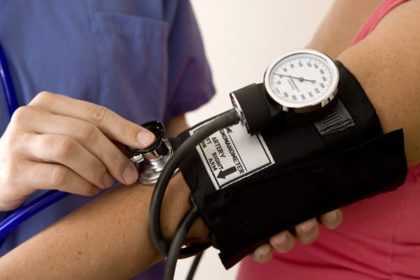If you’re like most people, you don’t think about your grip strength until you struggle to open a jar or untighten a knob. But now there’s the reason to know your actual grip strength. KRON 4 Morning News Weekend anchor, Marty Gonzalez, tests his grip, and I explain what your grip strength (or lack of it) says about your health.
What a Strong (or Weak) Grip Says About You
Research shows your grip strength is a good predictor of overall strength, and overall strength is a good predictor of overall health.
According to a four-year global study of over 140,000 people aged 35-70 years old in 17 countries, a weak grip is a stronger predictor for death from ANY cause compared to systolic* blood pressure. In other words, a firm, strong hand grip is a better health assessment tool than your blood pressure.
*Systolic blood pressure is the pressure in your arteries when your heart contracts. In one of our previous health segments, high pulse pressure is a predictor of heart attacks and cardiovascular disease — a sign of stiff, damaged arteries.

These findings were published in The Lancet, a peer-reviewed medical journal, and were broadly consistent across various countries and economic levels.
How to Measure Grip Strength
Muscle strength is measured by the grip. Your handshake can reveal your health status. Do you have a weak handshake or are you known for having a “vice grip”?

Grip strength testing is inexpensive, easily performed in a doctor’s office, and the results are immediate. NOTE: Grip strength is affected by a person’s stature:
- Circumference of the forearm
- Circumference of the hand
- Hand length
Since stature affects grip strength, relative grip strength is a better method of assessing muscle weakness (i.e., comparing changes in strength) vs. absolute grip strength using standard normative values.
Powerful Predictor of Death
The researchers found that every 11-pound decline in grip strength was linked to the following:
- 16% increase in death overall
- 17% increase in both cardiovascular and non-cardiovascular death
- 7% increase in the risk of myocardial infarction
- 9% increase in the risk of stroke
Grip strength may be a biomarker of aging where the loss of grip strength might be a good marker for underlying age-related disease.
Frailty and Survival
Grip strength is useful for identifying frailty among patients. In the aging population, frail status based on grip strength is associated with:
- Comorbidity (when two chronic diseases or conditions are simultaneously present in a patient)
- Cardiac risk
- Sarcopenia (age-related muscle loss)
Low muscle strength predisposes individuals to fatal outcomes when chronic medical problems occur, such as cancer, type 2 diabetes falls, fractures, respiratory illnesses. Although grip strength was not associated with developing these conditions, muscle strength could be good for survival.
Grip Strength Testing
These findings suggest that grip strength can have numerous useful applications as well as health implications:
- It can identify risk quickly and inexpensively in clinics/doctor’s offices.
- Avoid the need for imaging.
- Overcome possible limitations of walking-based tests. (Practical for patients with neuromuscular disorders.)
Improving Grip Strength and Function
More research is also needed to establish whether improving strength reduces an individual’s risk of death and cardiovascular disease. Nevertheless, strengthening your grip will improve your functionality and independence. Your hands are used for everyday gripping tasks, such as:
- Pinch-gripping a weight plate, heavy book, or plank of wood
- Turning knobs (e.g., to untighten a valve or adjust the seat on a Spin® bike at the gym)
- Carrying heavy suitcase or bag of groceries
- Squeezing a lemon
- Gripping a tennis racquet, golf club, baseball bat, ski pole, or dumbbell
- Crushing a soda can
- Holding onto and supporting yourself on a pull-up bar
- Unscrewing a stubborn bottle cap or jar lid
If you’re greeted by someone with a strong handshake, it’s likely that person regularly lifts or moves weight. Lifting weights can foster good health in a variety of ways (e.g., help you build strong bones and muscles that support a sturdy, sharper, more stable frame).
Karen’s Fit Tip: Prevent your muscles from atrophying (shrinking). Use them and feed them well. Muscle tissue needs healthy nutrients to maintain their strength and to get stronger. Eat a healthy balanced diet of whole grains, beans, nuts, fish, fruits, and vegetables.






